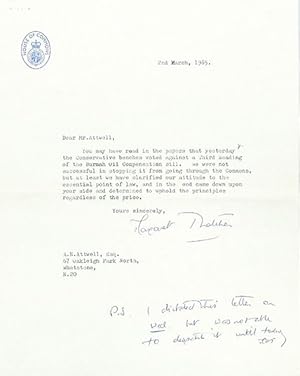About this Item
Two typed letters signed from Margaret Thatcher to her constituent Mr. A. N. Attwell of Oakleigh Park North, with his own copies of the correspondence, supporting with reservations the War Damage Act, then backtracking and opposing it, legislation which she was evidently conflicted by, clashing with her principles but saving the taxpayer much money. The Act was instigated by a legal case concerning the Burmah Oil Company's suing the British Crown for the destruction of their Burmese oil fields by British forces in the Second World War, to prevent them from falling into the hands of the Japanese. The legal case, which had been upheld by the Law Lords, was ended by the passing of the War Damage Act, which retroactively exempted the Crown from any liability for damage done during the War. The passage of the Act (given Royal Assent in June 1965) caused much controversy, retroactive legislation being very unusual under the British constitution and seen as counter to the principle of the rule of law, and so too it being frowned upon for Parliament to actively interfere to block a judicial process. Thatcher's constituent had written to her on 15 February (his original carbons here preserved with her responses), expressing his shock to hear of the Labour government's intention to introduce the Act, and even more shocked to hear the Conservatives had proposed a similar piece of legislation before. Attwell wrote "It is indeed a sad commentary on modern politics in Britain to find both the major parties agreed on a course of action that can only weaken the reputation of British justice. I would state that I have no personal interest whatever in the Burmah Oil Company, but feel impelled to express my deep concern at this latest evidence of the steady and continuous erosion of personal rights by the State. I sincerely trust that you will do all in your power to defeat this deplorable bill". Thatcher, then a backbench MP and yet to hold any office, responded to this rhetoric - rhetoric which is reminiscent of Thatcher's own - on the 19 February 1965, writing that though her "first reactions were the same as yours when I heard that this Bill was to come up", she was much shaken to hear that if the Bill was not passed, the cost to the taxpayer would be 160 million pounds, and this would raise the rate of income tax by 6 pence. Thatcher's principles, therefore, did not stretch to paying the price of higher taxation to fund them. Luckily, "I, personally, did not vote in the Division as I regret to say I had pneumonia at the time". She sends him a copy of Hansard, so he can read the debate, rather than repeating the points here. Thatcher has made one correction to the letter. Attwell responded on the 24 February thanking her for the Hansard, expressing his best wishes for her recovery, but points out the valid counter argument that the cost to the taxpayer should not affect the rights and wrong of the case, "and I sincerely hope that any decision of the courts, whether for £100 or £100 million, will always be upheld by the British legislature". Thatcher responded on 2 March, when the Conservative opposition, knowing the Bill would pass, decided to vote against it at the third reading, on the grounds of opposing retroactive legislation, thereby upholding the principle without the consequence, which Thatcher seems pleased by. "We were not successful in stopping it from going through the Commons, but at least we have clarified our attitude to the essential point of law, and in the end came down upon your side and determined to uphold the principles regardless of the price". Thatcher has added a manuscript postscript that she dictated the letter earlier, but was only able to despatch it that day. Attwell responded on the 6 March, praising the Conservatives' eventual decision to oppose the Bill. Thatcher's husband Denis, incidentally, became a director of Burmah Oil the following year. Thatcher does not mention the affair in her autobiography. 2 lett. Seller Inventory # 146804
Contact seller
Report this item
![]()




